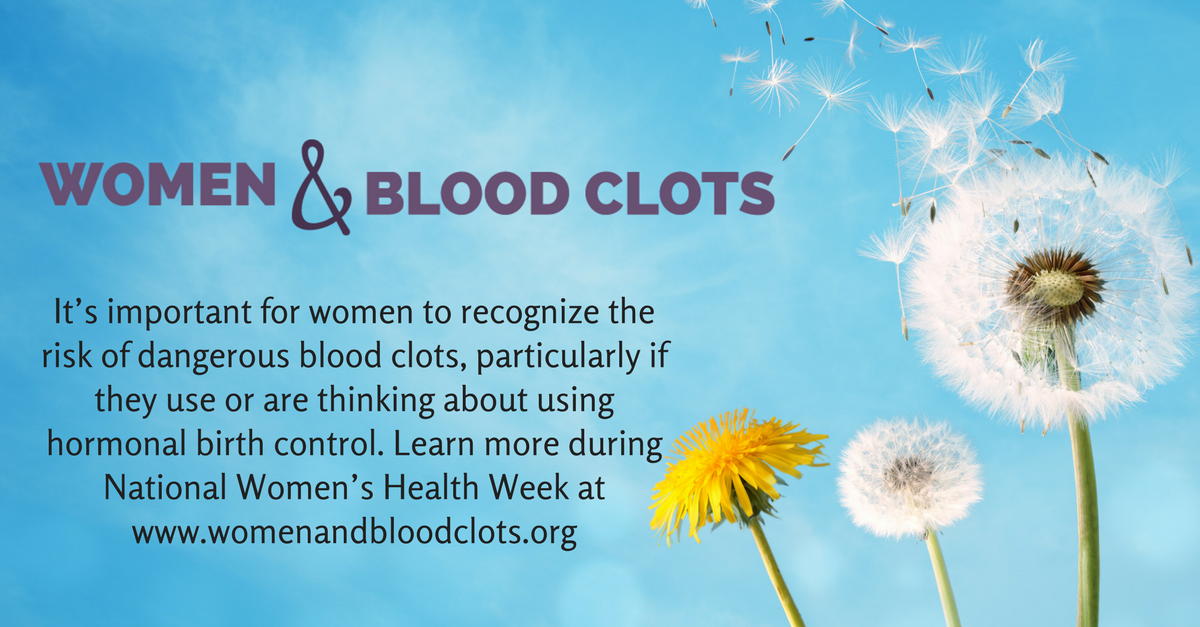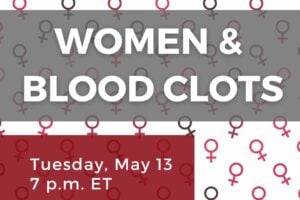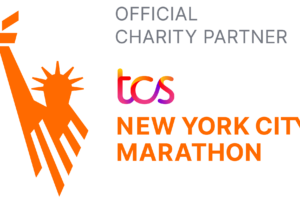A Movement to Raise Awareness about Birth Control and Blood Clot Risks
Stand with the National Blood Clot Alliance (NBCA) during National Women’s Health Week (NWHW), May 14-20, 2017, as we share life-saving information about dangerous blood clots.
Women face a distinctive risk for blood clots that spans much of their lifetime. This risk is connected to important choices women may make regarding family planning and birth control, pregnancy and childbirth, and the treatment of menopause symptoms. Each year, up to 900,000 people are affected by blood clots, and about 100,000 people will die because of blood clots. However, many of these deaths can be prevented simply by sharing life-saving information.
 Oral contraceptives are the most common form of hormonal birth control in the United States, and while research shows that they are safe and effective, the pill can carry risks like any other prescription medication. It is important for women to know their risks for blood clots, and to understand their options for birth control. The common risk factor for any form of hormonal birth control, including the pill, patch or ring, is the hormone estrogen, which increases the risk of dangerous blood clots, especially in women with a clotting disorder, a previous blood clot, or a family history of blood clots. Some of the newer hormonal birth control pills pose a greater blood clot risk than the older oral hormonal contraceptives, and the use of hormonal birth control patches and rings pose an even greater blood clot risk.
Oral contraceptives are the most common form of hormonal birth control in the United States, and while research shows that they are safe and effective, the pill can carry risks like any other prescription medication. It is important for women to know their risks for blood clots, and to understand their options for birth control. The common risk factor for any form of hormonal birth control, including the pill, patch or ring, is the hormone estrogen, which increases the risk of dangerous blood clots, especially in women with a clotting disorder, a previous blood clot, or a family history of blood clots. Some of the newer hormonal birth control pills pose a greater blood clot risk than the older oral hormonal contraceptives, and the use of hormonal birth control patches and rings pose an even greater blood clot risk.
![]() In recognition of Women’s Health Week 2017, the National Blood Clot Alliance is partnering with the Alexandra L. Rowan Memorial Foundation to provide women with this essential information, and to encourage them to visit Women & Blood Clots. At this website, on the Resources Page, women will find a risk assessment tool to help them determine, along with their doctor, their risk for blood clots and their best contraception options. Even if you are a woman at risk for blood clots, it is still possible for you to plan your family as you choose, by understanding your risk for blood clots and taking steps to reduce your risk.
In recognition of Women’s Health Week 2017, the National Blood Clot Alliance is partnering with the Alexandra L. Rowan Memorial Foundation to provide women with this essential information, and to encourage them to visit Women & Blood Clots. At this website, on the Resources Page, women will find a risk assessment tool to help them determine, along with their doctor, their risk for blood clots and their best contraception options. Even if you are a woman at risk for blood clots, it is still possible for you to plan your family as you choose, by understanding your risk for blood clots and taking steps to reduce your risk.
What is Women’s Health Week?
National Women’s Health Week is a special observance led by the U.S. Department of Health and Human Services Office on Women’s Health. The goal is to empower women to make their health a priority. The week also serves as a time to help women understand what steps they can take to improve their health throughout the entire year. National Women’s Health Week kicks off on Mother’s Day, May 14, and is celebrated through May 20, 2016.






